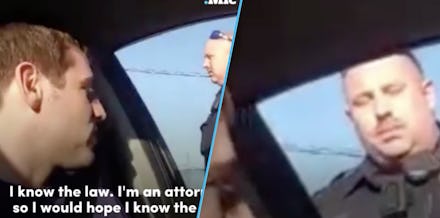Is it legal to film police? When officers made up a law, this man knew better.

When North Carolina Uber driver Jesse Bright was pulled over by Wilmington police in February, he decided to film the encounter on his phone.
Bright didn't stop recording, even when Wilmington police Sgt. Kenneth Becker told him that filming the police was against the law. Why? Because he knew it was a lie. In addition to being an Uber driver, Bright also happens to be a full-time criminal defense attorney, the Washington Post reported on Friday.
The officers reportedly said they stopped Bright because he'd taken his passenger to a drug house that was being surveilled. In the recording of the encounter, which went viral after Bright shared it with the media, Becker can be heard saying, "Don't record me ... You got me?"
Bright responds, "Look, you're a police officer on duty. I can record you."
"Be careful because there is a new law," Becker says. "Turn it off or I'll take you to jail."
Police searched Bright's car, but didn't find anything. He was eventually let go and faces no charges. But for Bright, it's important people know what's legal when it comes to getting stopped by police.
"I think the video shows that the police are willing to lie in order to coerce people into doing what they want them to do," he told the Post. "You just have to know your rights."
What are your rights if you get stopped by police?
The American Civil Liberties Union offers advice about what do to if you're stopped by police or other authorities. First and foremost is the right to remain silent — "If you wish to exercise that right, say so out loud," the ACLU advises.
You can refuse to consent to a police search of your person, car or home. But, as the ACLU's guide points out, "If police believe your car contains evidence of a crime, your car can be searched without your consent."
Is it legal to film the police?
Yes, it is. You're allowed to take photos and videos of things that are visible in public spaces — including police. Recordings of police help to build an "independent record" of events that take place, which can help to confirm or dispute either side's account of an incident.
According to the ACLU, there's a widespread pattern of officers telling people not to film them in public, and "harassing, detaining and arresting those who fail to comply."
As for Bright's case, the Wilmington police department has "launched an internal investigation" into the incident, Police Chief Ralph Evangelous said in a statement, according to the Post.
"Taking photographs and videos of people that are in plain sight including the police is your legal right," the statement said. "As a matter of fact we invite citizens to do so when they believe it is necessary. We believe that public videos help to protect the police as well as our citizens and provide critical information during police and citizen interaction."